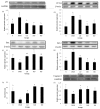Djulis (Chenopodium Formosanum) Prevents Colon Carcinogenesis via Regulating Antioxidative and Apoptotic Pathways in Rats
- PMID: 31509964
- PMCID: PMC6769785
- DOI: 10.3390/nu11092168
Djulis (Chenopodium Formosanum) Prevents Colon Carcinogenesis via Regulating Antioxidative and Apoptotic Pathways in Rats
Abstract
Djulis is a cereal crop rich in polyphenols and dietary fiber that may have nutraceutical activity to prevent colon cancer. This study was designed to examine the preventive effect of djulis on colon carcinogenesis in rats treated with 1,2-dimethylhydrazine (DMH). Rats were fed different AIN-93G-based diets: groups N and DMH were fed AIN-93G diet and groups LD, MD, and HD were fed AIN-93G diet containing 5, 10, and 20% djulis, respectively. All rats except for group N were injected with DMH to induce colon carcinogenesis. After 10 weeks, rats were sacrificed and colon and liver tissues were collected for analysis. The results showed that djulis-treated rats had significantly lower numbers of colonic preneoplastic lesions, aberrant crypt foci (ACF), sialomucin-producing (SIM)-ACF, and mucin-depleted foci. Djulis treatment increased superoxide dismutase and catalase activities in colon and liver. Djulis also reduced p53, Bcl-2, and proliferating cell nuclear antigen expressions and increased Bax and caspase-9 expressions. Besides, phenolic compounds and flavonoids were found rich in djulis. These results demonstrate the chemopreventive effect of djulis on carcinogen-induced colon carcinogenesis via regulating antioxidative and apoptotic pathways in rats. Djulis may have the potential to be developed as a valuable cereal product for chemoprevention of colon cancer.
Keywords: antioxidant; apoptosis; chemoprevention; colon cancer; djulis; preneoplastic lesions.
Conflict of interest statement
The authors declare no conflict of interest.
Figures


Similar articles
-
Synbiotic Combination of Djulis (Chenopodium formosanum) and Lactobacillus acidophilus Inhibits Colon Carcinogenesis in Rats.Nutrients. 2019 Dec 30;12(1):103. doi: 10.3390/nu12010103. Nutrients. 2019. PMID: 31905929 Free PMC article.
-
Lack of chemoprevention of dietary Agaricus blazei against rat colonic aberrant crypt foci.Hum Exp Toxicol. 2008 Jun;27(6):505-11. doi: 10.1177/0960327108091862. Hum Exp Toxicol. 2008. PMID: 18784204
-
Asiatic acid attenuates pre-neoplastic lesions, oxidative stress, biotransforming enzymes and histopathological alterations in 1,2-dimethylhydrazine-induced experimental rat colon carcinogenesis.Toxicol Mech Methods. 2017 Feb;27(2):136-150. doi: 10.1080/15376516.2016.1273422. Epub 2017 Jan 11. Toxicol Mech Methods. 2017. Retraction in: Toxicol Mech Methods. 2021 Mar;31(3):236. doi: 10.1080/15376516.2021.1883264. PMID: 28004603 Retracted.
-
New perspectives on djulis (Chenopodium formosanum Koidz.) and its potential application in functional food.Food Chem X. 2024 Dec 27;25:102135. doi: 10.1016/j.fochx.2024.102135. eCollection 2025 Jan. Food Chem X. 2024. PMID: 39877691 Free PMC article. Review.
-
Allyl sulfur compounds from garlic modulate aberrant crypt formation.J Nutr. 2006 Mar;136(3 Suppl):852S-854S. doi: 10.1093/jn/136.3.852S. J Nutr. 2006. PMID: 16484579 Review.
Cited by
-
Salt-Tolerant Plants, Halophytes, as Renewable Natural Resources for Cancer Prevention and Treatment: Roles of Phenolics and Flavonoids in Immunomodulation and Suppression of Oxidative Stress towards Cancer Management.Int J Mol Sci. 2023 Mar 8;24(6):5171. doi: 10.3390/ijms24065171. Int J Mol Sci. 2023. PMID: 36982245 Free PMC article. Review.
-
Integrative Omics Analysis Reveals Mechanisms of Anthocyanin Biosynthesis in Djulis Spikes.Plants (Basel). 2025 Jan 12;14(2):197. doi: 10.3390/plants14020197. Plants (Basel). 2025. PMID: 39861550 Free PMC article.
-
Development and Optimization of Djulis Sourdough Bread Using Taguchi Grey Relational Analysis.Foods. 2020 Aug 20;9(9):1149. doi: 10.3390/foods9091149. Foods. 2020. PMID: 32825461 Free PMC article.
-
Combination Therapy Using Polyphenols: An Efficient Way to Improve Antitumoral Activity and Reduce Resistance.Int J Mol Sci. 2022 Sep 6;23(18):10244. doi: 10.3390/ijms231810244. Int J Mol Sci. 2022. PMID: 36142147 Free PMC article. Review.
-
Polyphenol- and Glucuronoxylan-Rich Fiber Extract from Birch (Betula sp.) Wood Regulates Colonic Barrier Function and Cell Proliferation in Healthy Rats.J Agric Food Chem. 2024 Feb 21;72(7):3495-3505. doi: 10.1021/acs.jafc.3c07757. Epub 2024 Feb 11. J Agric Food Chem. 2024. PMID: 38343302 Free PMC article.
References
-
- Rosa L., Silva N., Soares N., Monteiro M., Teodoro A.J. Anticancer properties of phenolic acids in colon cancer–a review. J. Nutr. Food Sci. 2016;6:10–4172.
MeSH terms
Substances
Grants and funding
LinkOut - more resources
Full Text Sources
Medical
Research Materials
Miscellaneous

